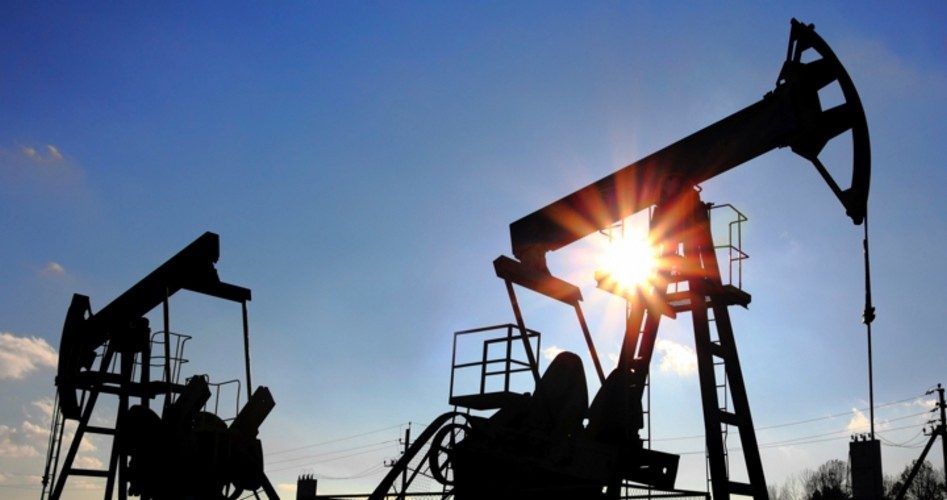
Following the emergency meeting attended over the weekend by members of the OPEC cartel and its non-members in Abu Dhabi, Saudi Arabia’s Energy Minister Khalid al-Falih said “We need to do whatever it takes to balance the oil market.” That goal is indicative of OPEC’s increasing nervousness that it is running out of options to counter increasing U.S. oil production. Last month, the EIA (Energy Information Administration) announced that the United States now leads the world in crude oil production, ahead of both Saudi Arabia and Russia.
For many years, the cartel was able to dictate oil policy and prices globally, bending the world oil markets to the cartel’s needs and purposes. Ten years ago, the United States was only able to produce five million barrels of oil a day (mbd), an insignificant amount compared to the cartel’s production. Today, that production has more than doubled and is likely to hit 15 mbd next year.
After the meeting ended on Sunday, Oman’s oil minister stated the blindingly obvious: “There is a consensus that there will be [a global crude oil] oversupply in 2019.” The only question is how much and how soon the cartel will order its members to cut. As Giovanni Staunovo, a commodities analyst at UBS Wealth Management, expressed it: “The size of any production cuts will likely depend on how much oil demand growth will slow in 2019, how much Iranian supply falls due to U.S. sanctions, and how strongly U.S. supply increases over the coming months.”
OPEC’s primary problem is those annoying “U.S. supply increases.” The bottlenecks strangling production in the Eagle Shale and Permian Basin oil fields are being resolved more quickly than OPEC estimated. There are six pipelines either being built or expanded which, according to experts, will bring another four million bpd to world markets no later than 2020. And there are 5,575 wells that have been developed but not completed — called DUCs — which can be brought online once those pipelines are completed.
OPEC also faces the political decisions being made in Washington concerning those sanctions against Iran. In anticipation of those sanctions being put in place in early November, oil prices began to rise, hitting $76 a barrel in Cushing, Oklahoma, and over $80 a barrel in London. This rise caused the president to call Saudi Arabia’s King Salman a couple of times to protest the rising prices of oil. But crude oil prices continued to rise in anticipation of the Iran sanctions due to hit in early November, which were estimated to take a million barrels a day off the world markets. Oil traders pushed the futures market higher, encouraged by Secretary of State Mike Pompeo’s comments in July that “the United States is going to enforce the sanctions.” Also helping was the virtual collapse of production from Venezuela’s state-owned oil company.
But then the State Department reversed direction and issued eight “waivers” allowing Iran to continue to export its oil production to them without penalty. Traders were caught long and reversed their positions, dropping the price of oil by more than 20 percent into bear market territory.
Instead of a dearth, there’s now every likelihood of a glut. OPEC now looks at the world much differently. China’s economy is slowing, thanks partly to internal mismanagement and the adoption of Keynesian economic policies (“You can spend your way into prosperity with borrowed or created money”) and thanks partly to the growing threat of tariffs by President Trump. At present those tariffs affect about half of China’s exports to the United States, and only at 10 percent. But come the end of the year they will jump to 25 percent. And if the meeting scheduled in Buenos Aires later on this month between the president and China’s communist leader Xi doesn’t go well and no agreement (or even a hint of one) is reached, Trump has clearly stated he will apply tariffs on the remaining $250 billion of Chinese exports that so far have escaped the penalty.
Other reports on slowing worldwide trade (and the consequent declining need for energy) are adding to the OPEC’s angst. To say nothing of what’s going on in America’s oil patch. The net result of all of this? OPEC is in the classic baseball “pickle.” Otherwise known as a rundown or the hotbox, a player is caught stranded between two bases (known as “no-man’s land”) and has the other team’s players closing in on him. Only in rare cases does he reach the safety of a bag before being tagged out.
If OPEC makes good on the Saudi oil minister’s threat and persuades the cartel in December to cut production by a million bpd, oil prices will go up. In fact as the statement from Oman’s oil minister hit the markets on Monday, prices of crude reversed by more than one percent.
But in the long run? Let’s let Adam Levine-Weinberg of The Motley Fool explain: “In the short term, production cuts by OPEC and its allies could drive up prices. But in the long run, any such moves would be self-defeating. U.S. oil production is primed to keep skyrocketing – the higher oil prices go in the short term, the bigger the jump in U.S. [crude oil] output will be.”
The cartel faces two primary problems. One, the United States, now a major oil producer, has no interest in playing the cartel game. It is doing just fine without joining a cartel in order to protect its market share or its profitability. Two, OPEC is facing pressure from its members to dissolve the cartel altogether and let each producer stand on its own. The Wall Street Journal reported last week that a Saudi-funded think tank, the King Abdullah Petroleum Studies and Research Center, has been studying a scenario under which OPEC would disband.
Put another way, the think tank is thinking the unthinkable: a free market in oil. Said the Saudi oil minister: “Think tanks like to think. We won’t discourage them from thinking … [but] we believe that any professional study by [them] will show that the combination of cooperation and mitigating extreme volatility [in the world’s oil markets] will be the best for the market.”
So the game continues: OPEC’s influence continues to wane as U.S. influence expands. Taking editorial license with what Shakespeare’s Macbeth actually said, OPEC “is a poor player that struts and frets his hour upon the stage and then is heard no more: it is a tale told by an idiot, full of sound and fury, signifying nothing.”
An Ivy League graduate and former investment advisor, Bob is a regular contributor to The New American magazine and blogs frequently at LightFromTheRight.com, primarily on economics and politics. He can be reached at [email protected].
Related article:



